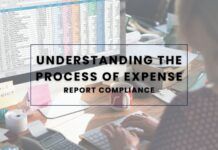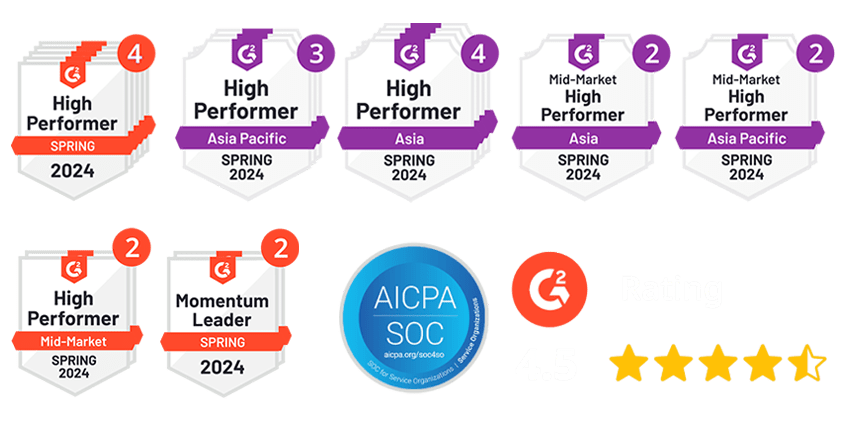An expense report policy is a set of rules about how employees can use company money for business and ask to be paid back. It helps companies keep track of their spending, follow laws, and be clear about how expenses are managed.
This blog post will explain why having a clear expense policy is important. A good expense policy helps businesses manage their spending, reduce the risk of fraud or misuse, and make the reimbursement processes smoother. By understanding the main parts of this policy, companies can keep their expenses in check and ensure everything runs efficiently.
What is an Expense Report Policy?
An expense report policy is a set of guidelines and rules established by an organization to regulate how employees can spend company funds for business purposes and how they can be reimbursed for work-related expenses. It typically outlines what expenses are considered valid and can be reimbursed, the process for submitting and approving expense reports, and any limitations or restrictions on spending.
This policy is crucial for organizations of all sizes because it helps ensure transparency, accountability, and compliance with company policies and regulations. It sets clear expectations for employees regarding what is acceptable when incurring work-related expenses on behalf of the company and provides a framework for managing and controlling costs.
Key Components of Expense Report Policy
An effective expense policy is crucial for maintaining financial discipline and transparency within an organization. Here are the key components that should be included:
1. Reimbursable and Non-Reimbursable Expenses
Every company must have a clear guideline on what are reimbursable and non-reimbursable expenses:
Reimbursable Expenses: These are work-related expenses that the organization agrees to cover for employees when they are incurred for legitimate business purposes. Examples include:
- Business Travel Expenses: Airfare, train tickets, rental cars, and mileage.
- Accommodation: Hotel stays during business trips.
- Meals: Meals eaten while traveling or during business meetings.
- Incidental expenses: Incidental expenses are nominal costs that employees may incur in addition to major expenses such as room service, laundry, and tips to service staff.
Non-Reimbursable Expenses: These are expenses that the organization does not cover because they are unrelated to business activities or deemed unnecessary. Examples include:
- Personal expenses: Personal meals, gifts, and personal phone calls.
- Fines and penalties: Traffic tickets, parking fines, and late fees.
- Entertainment expenses: Tickets to concerts, movies, or other personal entertainment activities.
2. Receipts and Documentation
An important part of an expense report policy is to guide employees to provide original receipts or other valid documents for all expenses they want to be reimbursed. Receipts should clearly show the date, amount spent, vendor’s name, and what the expense was for. Acceptable documents can include electronic receipts, scanned copies of paper receipts, or credit card statements with the work-related expenses clearly marked.
3. Approval Process
Assign people in the organization who can approve expenses based on their job role and authority level. Set up a clear approval process that shows who needs to approve expenses depending on the amount or type of expense. For instance, smaller expenses might only need approval from a direct supervisor, while bigger expenses might need approval from department heads or finance managers.
4. Timelines for Submitting Expense Reports
In your expense policy, set a deadline for employees to submit their expense reports, usually within a certain number of days after the expenses were made. This helps in processing expense reimbursements quickly and keeps financial records accurate. Extensions or exceptions to this deadline can be allowed in special cases, like long business trips or unexpected emergencies.
5. Set Rules for Policy Violations
Communicate the consequences for employees who violate the expense report policy to discourage misconduct and ensure compliance.
Consequences may include:
- Reimbursement refusal: Expenses incurred violating the policy may not be reimbursed.
- Disciplinary action: Employees who repeatedly violate the policy may face disciplinary measures, such as written warnings or probation.
By implementing these key components, organizations can create a comprehensive expense policy that promotes accountability, transparency, and responsible use of company resources.
What are the Benefits of Creating an Expense Policy?
Having an expense report policy in place offers several significant benefits for organizations. Let’s delve into each of these benefits:
1. Ensures Compliance with Company Policies and Legal Requirements
An expense policy provides clear rules for employees on what work-related expenses are allowed and how to report them. This clarity helps employees follow the company’s travel and expense management guidelines for spending company money on travel and other expenses.
Additionally, it helps the company meet legal requirements for expense reporting, reducing the risk of fines or penalties for not following the rules.
2. Prevents Fraud and Misuse of Company Funds
The main purpose of an expense report policy is to protect the company’s money by preventing fraud and misuse.
The policy explains how to document, approve, and reimburse expenses, creating a system to prevent fraud. It requires employees to provide proof of their expenses, which helps reduce the chances of unauthorized or improper spending.
3. Provides Transparency and Accountability in Financial Reporting
Transparency and accountability are key to good financial management. An expense policy helps ensure transparency by making sure that all employee expenses are clearly recorded and documented. This allows management, auditors, and finance teams to easily review and verify the company’s financial transactions.
Moreover, by requiring employees to follow a clear process for reporting their expenses, the policy promotes a culture of responsibility within the organization.
4. Streamlines the Reimbursement Process for Employees and Finance Teams
Without a clear expense report policy, the reimbursement process can be confusing and slow for both employees and finance teams.
But with a clear policy in place, everything becomes easier and more efficient. Employees understand which expenses can be reimbursed and how to properly submit their reports. This reduces mistakes and speeds up the process. Likewise, finance teams can quickly review and approve reports based on the policy, saving time and effort.
5. Facilitates Effective Budget Management
An expense policy is key to managing a company’s budget effectively. By clearly stating which work-related expenses are allowed and setting spending limits, the policy helps ensure spending stays within the budget and supports the company’s goals. This approach helps organizations use their resources more wisely, find ways to save costs, and keep their finances stable.
Moreover, the policy offers useful information on spending habits and patterns, which can help with better forecasting and planning for future budgets. In short, having a strong expense policy is crucial for improving financial performance and ensuring long-term success.
Best Practices to Create an Expense Report Policy
Creating an expense policy means setting clear rules for how employees can spend company money. Even if your company has some informal guidelines already, turning them into a written document can make the reimbursement process easier and ensure everyone understands the rules.
Here are some best practices to follow when creating an expense report policy:
1. Outline Expenses, Budgets, and Categories
To create a clear expense report policy, start by listing the types of expenses that employees can be reimbursed for.
Then, set budget limits for each type of expense to keep spending within the company’s financial limits. This helps control costs and ensures money is spent wisely.
Finally, group expenses by their type and purpose. This makes it easier to track spending, spot patterns, and find areas where costs can be cut or improved.
2. Balance Between Employee Satisfaction and Policy Enforcement
Balance employee satisfaction with following policies by treating everyone equally and avoiding exceptions. This way, everyone feels valued and fairness is maintained.
Also, be prompt with processing reimbursements. Just like you wouldn’t ask friends or family for a long, interest-free loan, don’t delay payments to your staff. Respecting their time can help create a better working environment.
3. Set Clarity in Guidelines
When creating your expense report policy, keep it simple and clear. Use plain language so employees can easily understand it. Include examples or scenarios to show how the policy should be applied, making it easier for employees to follow.
Also, add a summary or FAQ section that highlights the key points of the policy. This will help employees quickly find important information and avoid mistakes.
By making the policy easy to read and understand, you’ll encourage everyone to follow it and make the expense reporting process smoother.
4. Revise and Update
An effective expense policy should be flexible and updated regularly to keep up with changes in your company’s needs, rules, and industry standards.
To make sure the policy stays current, set up a process for regular reviews. This could involve creating a review committee or assigning someone to monitor and update the policy as needed.
Keeping the policy up to date helps ensure it remains useful and clear for employees on how to report expenses correctly and follow company rules.
5. Adhere to Local Regulations
It’s important to make sure your expense report policy follows local laws. The rules you set up when you started may not work as your company grows or laws change. For example, as your team gets bigger, you might need to adjust allowances in your policy.
If you’re unsure, get professional advice to stay compliant. Ignoring these rules can lead to serious problems, so always follow the regulations and update your policy as needed.
6. Leverage Technology for Streamlined Expense Management
Technology can transform how you handle expense management. By integrating expense management software with your accounting system, you can automate and simplify tasks that used to take a lot of time. This means your finance team won’t have to manually process expense information anymore.
Look into solutions that let employees avoid submitting expense reports manually. Manual filing is frustrating for employees and takes up a lot of time for your finance team and managers. Over time, this can become quite costly.
Simplify Expense Policy Management with Peakflo
Creating and managing an effective expense policy is crucial for every organization to ensure compliance, control costs, and streamline financial processes. Peakflo’s Travel and Expense Management Solution offers a comprehensive platform to facilitate this process.
With Peakflo, businesses can quickly set up and adjust expense policies to fit their needs. Here’s how the solution makes managing these policies easier:
- Effortlessly manage expense categories to provide a structured approach for recording and tracking company expenses.
- Easily define guidelines for fuel and mileage reimbursements.
- Optimize per diem expense policy by dynamically defining rates based on business travel duration, location, and expense categories.
- Automate and customize approval policies and automatically route them to stakeholders to avoid delays.
- Assign policy admins to create, edit, and view expense policy details.
The solution provides the tools and features necessary to create and manage expense policies effectively, helping businesses control costs and streamline financial processes.









![Why AI Sales Calls Are Making Good Sales Reps Even Better [2025 Guide] ai sales calls](https://cdn-kmjmp.nitrocdn.com/YvtqmrsiHUxqerlSiZgbfzqqTARWTElr/assets/images/optimized/rev-834053b/blog.peakflo.co/wp-content/uploads/2025/09/65168cf6-3001-4733-8cbc-12d5684cf449-218x150.webp)

































